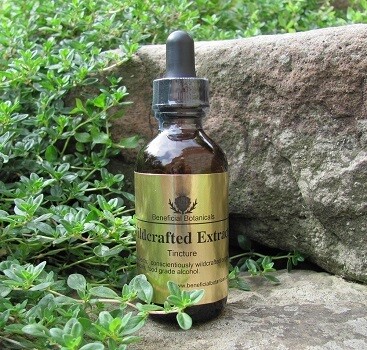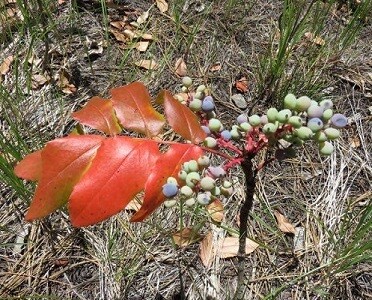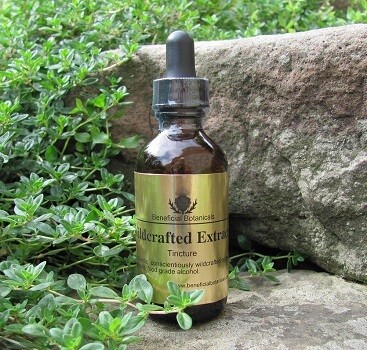Oregon Grape Root Tincture
Label: Beneficial Botanicals
Botanical Name: Mahonia repens
Other Names: Creeping Mahonia, Barberry
Parts Used: root
Organic: Yes Origin: USA
Menstruum: food grade alcohol
Tincture Ratio: 1:2
Note about the roots we use: The deep color of roots indicate a high berberine content.
Known Uses:
Antibacterial - staphyloccus, streptococcus, salmonella, shigella and e-coli
Mouthwash - oral lichen planus, bleeding gums, pyorrhea, and sore throat
Lower Blood Pressure
Liver / Gallbladder
[tab name="Overview"]
Alterative / Antibacterial / Antimicrobial / Astringent / Vasodilator / Hepatic / Aperient
Oregon Grape is in the same family as barberry and both contain the same alkaloids as Goldenseal. A note about Taxonomy: Some botanists place Mahonia repens, and the genus Mahonia as a whole, in the barberry genus Berberis. In this case, the scientific name may be given as Berberis repens. Additionally, some botanists treat the plant as a subspecies of tall Oregon grape (Berberis aquifolium), in which case the scientific name Berberis aquifolium var. repens is applied. You will find this plant under these other names including Mahonia aquilfolium, Berberry, Barberry, Berberis aquifolium, Berberis nervosa, and Berberis repens. The root of Oregon Grape has a very bitter taste due to the presence of the alkaloid berberine, one of this plant's main constituents.
Constituents: Alkaloids of the isoquinoline type; berberine, berbamine, hydrastine, oxycanthine.
[tab name="Use / Dosage"]
Used as a gargle oral aid, Oregon Grape Root tincture is known to work well with Purslane tincture to treat Oral Lichens Planus (OLP). The tincture can be taken internally to treat peptic ulcers, gastroesophageal reflux disease (GERD), stomach upset, and to treat diarrhea caused by giardia lamblia (giardiasis). The antibacterial properties of berbamine have shown activity against staphyloccus, streptococcus, salmonella, shigella and escherichia coli. Oregon Grape has been traditionally used as a liver "cleanser" as it will increase bile production. And, when used in combination with Dandelion or Milk Thistle, it can be very effective in treating hepatitis B and jaundice.
Known Dosages (for Adults)
Oral Lichen Planus : Blend with Purslane (Portulaca oleracea) tincture in a 1:1 ratio and use as a gargle 3 times a day until sores have healed. To avoid recurrence of OLP, address the trigger for the immune dysfunction such as a pharmaceutical drug, hepatitis C, allergens or elevated stress. Check in with your healthcare provider since OLP may increase the risk of oral cancers such as squamous cell carcinoma.
Bleeding Gums / Pyorrhea / Sore Throat : Use as a gargle 3 times a day until symptoms subside.
Antibiotic : For mild infections 1 teaspoon of the tincture in warm water, four to five times a day and continue for two days after all symptoms have ceased to be noticed. Do not take for more than ten consecutive days.
Blood pressure : Oregon Grape Root helps to dilate blood vessels and thus lower blood pressure. Take in small frequent doses of ¼ teaspoon of tincture five to six times daily. Do not take for more than ten consecutive days.
Liver / Gallbladder : Oregon Grape Root can be used in stomach and gallbladder conditions where there is associated nausea and vomiting. Mix the tincture with an equal amount of Gentian tincture. Take ½ teaspoon three to four times daily. Do not exceed ten consecutive days.
Urinary Tract Infection (UTI) : The alkaloid, berberine, may prevent UTIs by inhibiting bacteria from adhering to the wall of the urinary bladder. No dosage information available.
[tab name="Precautions"]
Avoid use if you have a hyperthyroid condition.
Do not take Oregon Grape Root tincture internally for more than 10 consecutive days. Over dosing is dangerous as consumption of increased amount of berberine could cause poisoning or death. High doses can cause vomiting, as well as lower blood pressure and heart rate.
Oregon Grape Root may interfere with the way the body processes certain drugs using the liver's cytochrome P450 enzyme system. As a result, the levels of these drugs may be increased in the blood and may cause increased effects or potential serious adverse reactions.
Oregon Grape Root may increase the amount of drowsiness caused by some drugs with sedative effects. Examples include benzodiazepine such as lorazepam (Ativan®) or diazepam (Valium®), barbiturates such as phenobarbital, narcotics such as codeine, some antidepressants, CNS depressants, and alcohol.
Caution is advised while driving or operating machinery while taking this tincture.
Oregon Grape Root may interact with antibiotics, anticancer drugs, cardiovascular drugs, cyclosporine, drugs that affect the immune system, drugs that prevent or relieve seizures, gastrointestinal agents, and tetracycline.
Berberine, a chemical found in Oregon Grape Root, may cause jaundice (yellowing of the skin and eyes) in infants by interfering with normal bilirubin metabolism and is therefore not recommended in jaundiced neonates and pregnant women.
[tab name="References"]
Natural Medicines Comprehensive Database
Natural Standard Research Collaboration
Hahn FE, Ciak J. Berberine. Antibiotics 1976;3:577-88
Schulz V, Hänsel R, Tyler VE. Rational Phytotherapy: A Physician's Guide to Herbal Medicine. 3rd ed, Berlin: Springer, 1998, 168-73.
Galle K, Müller-Jakic B, Proebstle A, et al. Analytical and pharmacological studies on Mahonia aquifolium. Phytomedicine 1994;1:59-62.
Chan E. Displacement of bilirubin from albumin by berberine. Biol Neonate 1993;63:201-8.
[endtab]
These statements have not been evaluated by the Food and Drug Administration. The information provided here is intended to supplement, not substitute for, the expertise and judgement of your physician, pharmacist or other healthcare provider and should not be construed to indicate that the use of this herbal product is safe, appropriate, or effective for you. Consult your healthcare provider before taking this herbal product.




